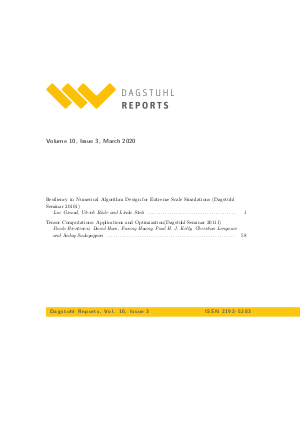Dagstuhl Reports, Volume 10, Issue 3
-
Part of:
Volume:
Dagstuhl Reports, Volume 10
Journal: Dagstuhl Reports (DagRep)

Event
- Dagstuhl Seminars 20101, 20111
Publication Details
- published at: 2020-12-21
- Publisher: Schloss Dagstuhl – Leibniz-Zentrum für Informatik
- DBLP: db/journals/dagstuhl-reports/dagstuhl-reports10
Access Numbers
- Detailed Access Statistics available here
-
Total Document Accesses (updated on a weekly basis):
0PDF Downloads
Documents
Dagstuhl Reports, Volume 10, Issue 3, March 2020, Complete Issue
Abstract
Cite as
Dagstuhl Reports, Volume 10, Issue 3, pp. 1-72, Schloss Dagstuhl – Leibniz-Zentrum für Informatik (2020)
Copy BibTex To Clipboard
@Article{DagRep.10.3,
title = {{Dagstuhl Reports, Volume 10, Issue 3, March 2020, Complete Issue}},
pages = {1--72},
journal = {Dagstuhl Reports},
ISSN = {2192-5283},
year = {2020},
volume = {10},
number = {3},
publisher = {Schloss Dagstuhl -- Leibniz-Zentrum f{\"u}r Informatik},
address = {Dagstuhl, Germany},
URL = {https://drops.dagstuhl.de/entities/document/10.4230/DagRep.10.3},
URN = {urn:nbn:de:0030-drops-134271},
doi = {10.4230/DagRep.10.3},
annote = {Keywords: Dagstuhl Reports, Volume 10, Issue 3, March 2020, Complete Issue}
}
Dagstuhl Reports, Table of Contents, Volume 10, Issue 3, 2020
Abstract
Cite as
Dagstuhl Reports, Volume 10, Issue 3, pp. i-ii, Schloss Dagstuhl – Leibniz-Zentrum für Informatik (2020)
Copy BibTex To Clipboard
@Article{DagRep.10.3.i,
title = {{Dagstuhl Reports, Table of Contents, Volume 10, Issue 3, 2020}},
pages = {i--ii},
journal = {Dagstuhl Reports},
ISSN = {2192-5283},
year = {2020},
volume = {10},
number = {3},
publisher = {Schloss Dagstuhl -- Leibniz-Zentrum f{\"u}r Informatik},
address = {Dagstuhl, Germany},
URL = {https://drops.dagstuhl.de/entities/document/10.4230/DagRep.10.3.i},
URN = {urn:nbn:de:0030-drops-134282},
doi = {10.4230/DagRep.10.3.i},
annote = {Keywords: Table of Contents, Frontmatter}
}
Resiliency in Numerical Algorithm Design for Extreme Scale Simulations (Dagstuhl Seminar 20101)
Abstract
Cite as
Luc Giraud, Ulrich Rüde, and Linda Stals. Resiliency in Numerical Algorithm Design for Extreme Scale Simulations (Dagstuhl Seminar 20101). In Dagstuhl Reports, Volume 10, Issue 3, pp. 1-57, Schloss Dagstuhl – Leibniz-Zentrum für Informatik (2020)
Copy BibTex To Clipboard
@Article{giraud_et_al:DagRep.10.3.1,
author = {Giraud, Luc and R\"{u}de, Ulrich and Stals, Linda},
title = {{Resiliency in Numerical Algorithm Design for Extreme Scale Simulations (Dagstuhl Seminar 20101)}},
pages = {1--57},
journal = {Dagstuhl Reports},
ISSN = {2192-5283},
year = {2020},
volume = {10},
number = {3},
editor = {Giraud, Luc and R\"{u}de, Ulrich and Stals, Linda},
publisher = {Schloss Dagstuhl -- Leibniz-Zentrum f{\"u}r Informatik},
address = {Dagstuhl, Germany},
URL = {https://drops.dagstuhl.de/entities/document/10.4230/DagRep.10.3.1},
URN = {urn:nbn:de:0030-drops-134290},
doi = {10.4230/DagRep.10.3.1},
annote = {Keywords: Numerical algorithms, Parallel computer architecture, Fault tolerance, Resilience}
}
Tensor Computations: Applications and Optimization (Dagstuhl Seminar 20111)
Abstract
Cite as
Paolo Bientinesi, David Ham, Furong Huang, Paul H. J. Kelly, Christian Lengauer, and Saday Sadayappan. Tensor Computations: Applications and Optimization (Dagstuhl Seminar 20111). In Dagstuhl Reports, Volume 10, Issue 3, pp. 58-70, Schloss Dagstuhl – Leibniz-Zentrum für Informatik (2020)
Copy BibTex To Clipboard
@Article{bientinesi_et_al:DagRep.10.3.58,
author = {Bientinesi, Paolo and Ham, David and Huang, Furong and Kelly, Paul H. J. and Lengauer, Christian and Sadayappan, Saday},
title = {{Tensor Computations: Applications and Optimization (Dagstuhl Seminar 20111)}},
pages = {58--70},
journal = {Dagstuhl Reports},
ISSN = {2192-5283},
year = {2020},
volume = {10},
number = {3},
editor = {Bientinesi, Paolo and Ham, David and Huang, Furong and Kelly, Paul H. J. and Lengauer, Christian and Sadayappan, Saday},
publisher = {Schloss Dagstuhl -- Leibniz-Zentrum f{\"u}r Informatik},
address = {Dagstuhl, Germany},
URL = {https://drops.dagstuhl.de/entities/document/10.4230/DagRep.10.3.58},
URN = {urn:nbn:de:0030-drops-134303},
doi = {10.4230/DagRep.10.3.58},
annote = {Keywords: compilers, computational science, linear algebra, machine learning, numerical methods}
}